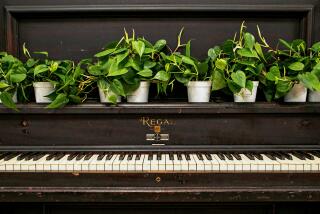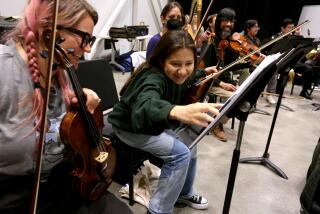PRIZE-WINNING CELLIST JOANNA PICKER RETURNS
- Share via
A fourth-place finish at the prestigious Tchaikovsky Competition, impressive though it may be, is not as good as gold. Joanna Picker will attest to that.
The 22-year-old Austrian beat out all but three cellists in Moscow last summer, but thus far has nothing to show for it. “Since the Tchaikovsky,” she admitted, “I’ve received no invitations (to perform). I’m a little bit astonished, actually.”
Speaking by telephone from her home in Linz, Picker chose not to dwell on the apparent emptiness of her excellent showing in Moscow. Instead, the ever-enthusiastic musician spoke excitedly about her Los Angeles concert appearance this weekend.
That engagement with the Young Musicians Foundation Debut Orchestra, Sunday night in Royce Hall, comes as part of another, far less glamorous contest--the National Debut Competition, which she won here in December, 1985. It didn’t make international headlines, but for Picker that win was a big one.
Capturing the YMF prize “means at least as much to me as the Tchaikovsky,” she said. For one thing, the award offers a performance opportunity--on Sunday she will play the Dvorak Concerto with Keith Clark conducting--something even the Gold Medal in Moscow can’t promise. Then, there’s the cash award included in her YMF triumph. “I won $5,000 !” she exclaimed, adding that the money couldn’t have come at a better time.
In late ‘85, Picker explained, she had completed more than two years of study at USC with Eleonore Schoenfeld. The experience was valuable but, the Salzburg-born cellist noted, it had its price. “I was in a very difficult financial situation at the time. Foreign students are only allowed partial scholarships, so it was very expensive. The (YMF) money allowed me to pay all my debts.”
The cellist quickly steered the conversation away from her monetary struggles, preferring instead to praise Schoenfeld, whom she had met during a 1981 Piatigorsky seminar. “I had a few lessons with her then, and she invited me to come back and study. It was a difficult decision for me, because I had always worked so closely with my parents.”
Both Picker’s father and mother are veterans of the faculty at the Linz Conservatory. Her cellist father had taught her since the age of 6, while her pianist mother had served as her exclusive accompanist--including the Moscow competition.
“There had never been any parental pressure on me, even though I am an only child,” Picker said. “They would have been tolerant if I had decided not to go into music. And they were quite supportive of my decision to come to America.”
Schoenfeld, Picker noted, was “demanding but very positive. She showed me more than technique--she taught me how to communicate with an orchestra, how to rehearse. In the past year I feel I’ve grown tremendously--I’ve been able to realize what Eleonore had shown me. I am happy with my music now, but I’m concerned about my career. I want to perform more.
“I am committed to being a recitalist,” she insisted, adding that even though her Moscow showing has borne no fruit, there are enough engagements in Europe to keep her busy--many of them as a result of her capturing the Silver Medal at the 1986 International Cello Competition in Geneva.
Was the Tchaikovsky experience, then, just a waste of time? “I see such contests the same way I view the concert situation: You’re aware of the risks whenever you play.”
More to Read
The biggest entertainment stories
Get our big stories about Hollywood, film, television, music, arts, culture and more right in your inbox as soon as they publish.
You may occasionally receive promotional content from the Los Angeles Times.










